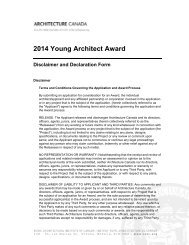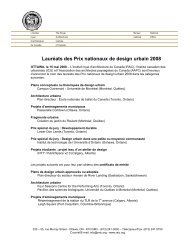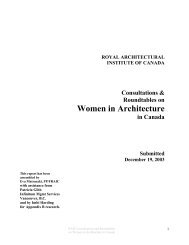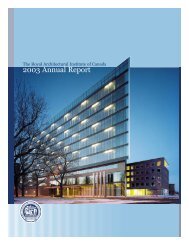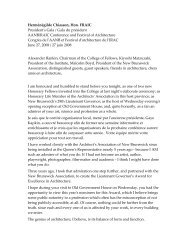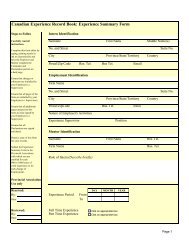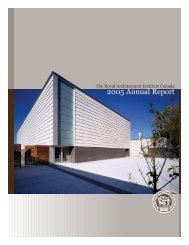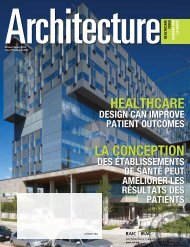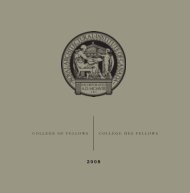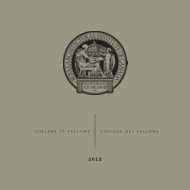Benchmark Study on Green Buildings - Royal Architectural Institute ...
Benchmark Study on Green Buildings - Royal Architectural Institute ...
Benchmark Study on Green Buildings - Royal Architectural Institute ...
Create successful ePaper yourself
Turn your PDF publications into a flip-book with our unique Google optimized e-Paper software.
laboratory for the Department of Energy’s (DoE) Office of Energy Efficiency and<br />
Renewable Energy which provides the majority of its funding. Other funding comes from<br />
DoE’s Office of Science and Office of Electricity Transmissi<strong>on</strong> and Distributi<strong>on</strong>.<br />
NREL’s technical disciplines focus <strong>on</strong> development and characterizati<strong>on</strong> of renewable<br />
energy and energy efficiency technologies. They include: biological sciences, building<br />
technologies, chemical sciences, computati<strong>on</strong>al sciences, electrocatalysis, energy<br />
c<strong>on</strong>versi<strong>on</strong> and storage, materials sciences, nanoscience, optoelectr<strong>on</strong>ic technologies,<br />
solid state spectroscopy, and solid-state theory. In additi<strong>on</strong>, NREL is developing a<br />
systems integrati<strong>on</strong> capability. The systems integrati<strong>on</strong> functi<strong>on</strong> will deliver independent<br />
and objective analyses, advice, and planning opti<strong>on</strong>s that enable DoE to make informed<br />
program decisi<strong>on</strong>s that advance the goals of the DoE Hydrogen Program. NREL partners<br />
with internati<strong>on</strong>al, envir<strong>on</strong>mental, and government agencies to find renewable energy and<br />
energy efficiency soluti<strong>on</strong>s. The Laboratory works with industry to transform NREL<br />
expertise and technology into commercially viable products. The Laboratory also licenses<br />
its technologies to promote commercializati<strong>on</strong> of clean, efficient, and sustainable energy<br />
opti<strong>on</strong>s. A significant porti<strong>on</strong> of American energy R&D is d<strong>on</strong>e by the NREL, which is<br />
encouraging as this type of research is all focused <strong>on</strong> sustainable energy.<br />
Sustainable Energy Coaliti<strong>on</strong> (SEC):<br />
The Sustainable Energy Coaliti<strong>on</strong> (SEC) brings together more than 30 nati<strong>on</strong>al business,<br />
envir<strong>on</strong>mental, c<strong>on</strong>sumer, and energy policy organizati<strong>on</strong>s to promote increased federal<br />
support for energy efficiency and renewable energy technologies and reduced federal<br />
support for unsafe or polluting energy resources. Coaliti<strong>on</strong> members advocate federal<br />
energy policies that will lead to a cleaner envir<strong>on</strong>ment, safe reliable energy technologies,<br />
and a secure, prosperous future for all Americans. Areas of Coaliti<strong>on</strong> activity include<br />
policy decisi<strong>on</strong>s <strong>on</strong> the federal budget, electric utility restructuring, polluti<strong>on</strong> preventi<strong>on</strong>,<br />
climate change, and tax policies. Member organizati<strong>on</strong>s of the Sustainable Energy<br />
Coaliti<strong>on</strong> do not support every item or issue adopted by the Coaliti<strong>on</strong> and generally focus<br />
<strong>on</strong> their issue area within the Coaliti<strong>on</strong> recommendati<strong>on</strong>s and policy positi<strong>on</strong>s. SEC<br />
members include such notable organizati<strong>on</strong>s as the Alliance to Save Energy, the<br />
American Council for an Energy-Efficient Ec<strong>on</strong>omy, and the World Wildlife Fund.<br />
American Council for an Energy-Efficient Ec<strong>on</strong>omy (ACEEE):<br />
The American Council for an Energy-Efficient Ec<strong>on</strong>omy (ACEEE) is a n<strong>on</strong>-profit<br />
organizati<strong>on</strong> dedicated to advancing energy efficiency as a means of promoting both<br />
ec<strong>on</strong>omic prosperity and envir<strong>on</strong>mental protecti<strong>on</strong>. The ACEEE fulfills its missi<strong>on</strong> by:<br />
c<strong>on</strong>ducting in-depth technical and policy assessments; advising policymakers and<br />
program managers; working collaboratively with businesses, public interest groups, and<br />
other organizati<strong>on</strong>s; organizing c<strong>on</strong>ferences and workshops; publishing books,<br />
c<strong>on</strong>ference proceedings, and reports; and educating c<strong>on</strong>sumers and businesses. ACEEE<br />
projects are carried out by staff and selected energy efficiency experts from universities,<br />
nati<strong>on</strong>al laboratories, and the private sector. The ACEEE’s program areas include: energy<br />
policy; buildings and equipment; utilities; industry; transportati<strong>on</strong>; internati<strong>on</strong>al<br />
development; and Communicati<strong>on</strong>s and C<strong>on</strong>ferences. Collaborati<strong>on</strong> is key to ACEEE’s<br />
success. It collaborates <strong>on</strong> projects and initiatives with dozens of organizati<strong>on</strong>s including<br />
federal and state agencies, utilities, research instituti<strong>on</strong>s, businesses, and public interest<br />
46



